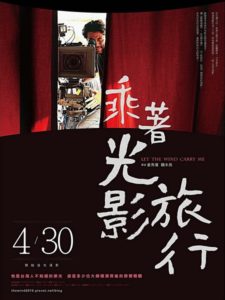Let the Wind Carry Me: The Fleeting Moments of Mark Lee
乘着光影旅行 李屏宾的摄影人生
Taiwan, 2010, colour, 1.85:1, 87 mins.
Directors: Jiang Xiuqiong 姜秀琼, Guan Benliang 关本良 [Kwan Pun-leung].
Rating: 7/10.
Evocative documentary on Taiwan d.p. Li Pingbin [Mark Lee] is flawed only by a shortage of bio.
Portrait of Taiwan-born cinematographer Li Pingbin [Mark Lee], 55, following him over the course of three years in Taiwan, Hong Kong, Japan and Europe, and interviewing more than 20 associates and observers about his work during almost 30 years.
REVIEW
With over 50 movies to his credit since the 1982 Portrait of a Fanatic 苦恋, Li Pingbin 李屏宾 [Mark Lee] is one of Asia’s few cinematographers whose name means something outside the region – and not just because he’s adopted a western forename. The regular d.p. of Hou Xiaoxian 侯孝贤 since A Time to Live and a Time to Die 童年往事 (1986), as well as collaborating regularly with Hong Kong director Xu Anhua 许鞍华 [Ann Hui] in the 1990s (My American Grandson 上海假期, 1991; Summer Snow 女人四十。, 1995; Eighteen Springs 半生缘, 1997), Li got the biggest boost to his career when In the Mood for Love 花样年华 (by Wang Jiawei 王家卫 [Wong Kar-wai]) and The Vertical Ray of the Sun [by Trần Anh Hùng]) showed in Cannes’ Official Selection in 2000. Suddenly, observers outside Asia started connecting the dots and realised Li was the common element in some of the region’s most strikingly shot movies of the past decade. In that sense, a documentary on him has been an event waiting to happen.
Let the Wind Carry Me: The Fleeting Moments of Mark Lee 乘着光影旅行 李屏宾的摄影人生 is a labour of love by Taiwan director Jiang Xiuqiong 姜秀琼, who directed the family/gay drama Artemisia 艾草 (2008), and Hong Kong d.p. Guan Benliang 关本良 [Kwan Pun-leung], who’s worked with Xu, Guan Jinpeng 关锦鹏 [Stanley Kwan] and Wang (including 2046, 2004, and second unit on In the Mood for Love). It reveals Li, 55, as an instinctive artist wedded to his work, a self-confessed gypsy with a wife, son and daughter in Los Angeles whom he hardly sees. Interviewees bear witness to his modest nature that masks a quiet authority that younger directors find supportive (witness Xu Jinglei 徐静蕾 on Letter from an Unknown Woman 一个陌生女人的来信, 2004) and which helps to bind crews together when on difficult locations (witness Jiang Wen 姜文 on The Sun Also Rises 太阳照常升起, 2007). A loner with no team of assistants, he’s always well prepared, highly focused and inspires any crew: Zhang Aijia 张艾嘉 [Sylvia Chang] calls him “a general” and Wang adds, “If [d.p.] Chris Doyle 杜可风 is a sailor, then Mark Lee is a soldier.”
Observers of all stripes testify to Li’s flexibility, to his ability to profit from unexpected weather conditions rather than wait around for them to clear. Li puts this down to his decade working in Hong Kong, where crews are paid by the hour; but it also comes from his apparent feel for nature (“He blooms whenever he gets to an open space,” notes Wang) and the opportunities it presents, often ignored by cinematographers more wedded to the script. His Hong Kong years also taught him faster, handheld shooting, liberating him from the tripod style he’d learned working for Taiwan’s CMPC during the 1980s.
For those who know only Li’s damped-down look for Hou – what he calls “colour b&w films” – it will come as a surprise that he occasionally tried to quietly subvert Hou’s demands (sneaking extra light and colour into The Puppetmaster 戏梦人生, 1993) and that he relishes a brighter look (Trần’s lustrous Sun, Jiang’s flashier Sun). Though it’s difficult to find a common element in his movies, he at one point sums up his credo as attempting to “integrate real light and colour with people.”
Good-quality clips from his work are well integrated and in their correct aspect ratios, but some interviews (Trần, Koreeda Hirokazu 是枝裕和) are so brief and unrevealing as to be almost pointless: more room could have been found by cutting down on footage which just shows Li walking around. There’s little on the man outside his work, apart from his interest in collecting pottery (from whose colours he says he often draws inspiration).
The documentary is also light on hard dates and biographical detail, especially prior to Li becoming a d.p. There’s plenty of footage of him and his 80-year-old mum Wang Yongzhu 王永珠, to whom he’s devoted; but (apart from one wedding photo) nothing on his American wife Robin Crist, whom he married in 1987, or children (apart from one brief interview with his son Li Suxiang 李苏翔 [Justin Lee]). Like his art, Li remains something of an enigma, his bearded, vagabond-like features concealing hidden feelings the film only hints at.
CREDITS
Presented by Yonder Pictures (TW). Produced by Yonder Pictures (TW).
Photography: Guan Benliang [Kwan Pun-leung], Yao Hongyi, Zhang Ying, Jiang Xiuqiong. Editing: Guan Benliang [Kwan Pun-leung], Xu Hongyuan. Sound: Guo Liqi.
With: Li Pingbin [Mark Lee], Hou Xiaoxian, Du Duzhi, Lin Hongzhong, Yao Hongyi, Wang Yongzhu, Zhang Aijia [Sylvia Chang], Wang Jiawei [Wong Kar-wai], Chen Changlun, Shu Qi, Gilles Bourdos, Xu Jinglei, Romain Douris, Yukisada Isao, Trần Anh Hùng, Benoît Barouh, Jiang Wen, Liu Weihan, Lan Zuwei, Yun Jingguo, Li Suxiang [Justin Lee], Koreeda Hirokazu.
Release: Taiwan, 30 Apr 2010.
(Review originally published on Film Business Asia, 2 Jun 2010.)
